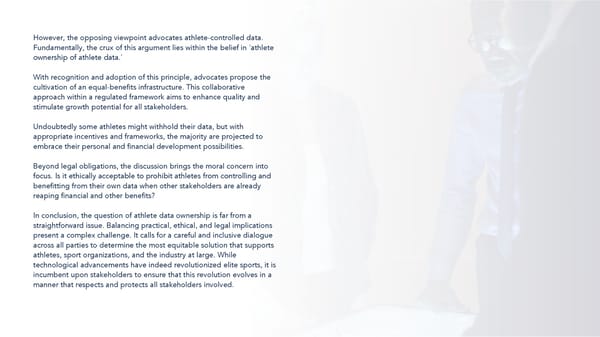However, the opposing viewpoint advocates athlete-controlled data. Fundamentally, the crux of this argument lies within the belief in 'athlete ownership of athlete data.' With recognition and adoption of this principle, advocates propose the cultivation of an equal-benefits infrastructure. This collaborative approach within a regulated framework aims to enhance quality and stimulate growth potential for all stakeholders. Undoubtedly some athletes might withhold their data, but with appropriate incentives and frameworks, the majority are projected to embrace their personal and financial development possibilities. Beyond legal obligations, the discussion brings the moral concern into focus. Is it ethically acceptable to prohibit athletes from controlling and benefitting from their own data when other stakeholders are already reaping financial and other benefits? In conclusion, the question of athlete data ownership is far from a straightforward issue. Balancing practical, ethical, and legal implications present a complex challenge. It calls for a careful and inclusive dialogue across all parties to determine the most equitable solution that supports athletes, sport organizations, and the industry at large. While technological advancements have indeed revolutionized elite sports, it is incumbent upon stakeholders to ensure that this revolution evolves in a manner that respects and protects all stakeholders involved.
 The Sports Technology Annual Review 2023 Page 30 Page 32
The Sports Technology Annual Review 2023 Page 30 Page 32